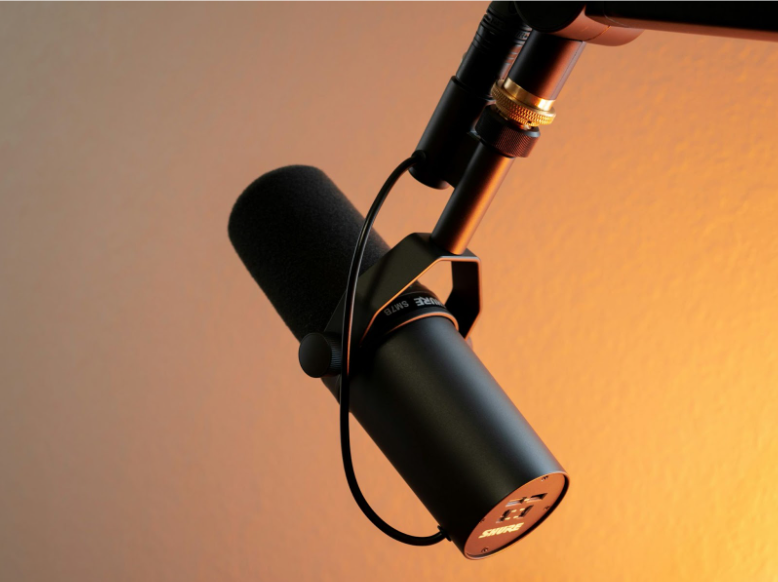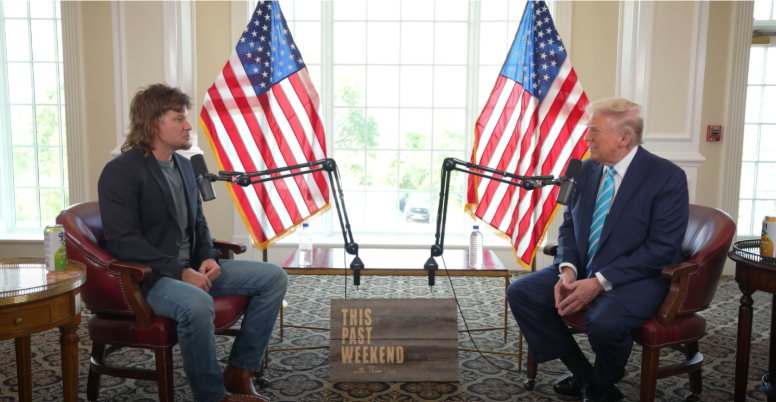
s the dust settles and analysts begin studying the 2024 Presidential election, it appears that a new nickname has risen for it: the “podcast election.” The nickname highlights the fact that political candidates and politicians rejected traditional media and journalists in turn for appearing on alternate media such as podcast shows. Shows that seemed to have more to do with comedy or pop culture or lifestyle quickly turned into strategic tools for political campaigns. With the general rise in popularity for podcasts and their usage by politicians throughout the 2024 election, it appears that podcasts are becoming an integral part of mainstream politics.
When it comes to podcasts during the election, one is instantly reminded of now President-elect Donald J. Trump, who used this medium the most during the campaign. He would appear on multiple large-name shows: “This Past Weekend with Theo Von,” “Impaulsive,” “Lex Fridman Podcast” and perhaps the most famous of them all, “The Joe Rogan Experience.” These podcasts have millions of subscribers, and generated millions of views. For example, the appearance of Trump on Joe Rogan’s podcast accumulated about 24 million views within a day. Many of these podcasts notably have an audience made up of young males, a demographic which the Republican candidate was most likely trying to draw favor from.
Trump would talk about the typical hot topic political issues, but also displayed a more personal side, such as when he talked about personal experiences with drug addiction in his family. While many debate on how impactful the podcast appearances were for Trump’s victory, there’s no doubt they played an integral role in the social media part of his campaign. This seemed to be recognized by one of Trump’s close friends and the Ultimate Fighting Champion (UFC) CEO Dana White. During a statement during Trump’s victory speech, he thanked multiple podcast hosts as well as “the mighty and powerful Joe Rogan” who endorsed Trump on the eve of Election Day.
Vice President and Democratic presidential candidate Kamala Harris would also go on a few podcasts, most notably the “Call Her Daddy” podcast, the fifth most popular podcast on Spotify. On that podcast, Harris would also talk about political issues, especially those pertaining to women, as well as her own personal experiences. Another podcast she appeared on was the “All the Smoke” podcast, where, alongside other topics, she talked about mental health issues in America, as well as her own experiences with mental health. These two podcast episodes generated nearly a million views each.
Other political figures would go on podcasts throughout the election. Republican Vice President candidate J.D. Vance appeared on the “Ruthless” podcast two days after his debate with Democratic Vice President candidate Tim Walz to talk about his own debate performance. Vance would also go on the “Joe Rogan Experience,” following his running mate. Walz himself would appear on the “SmartLess” show to talk about political issues, vintage cars and the campaign.

The Pros and Cons of Podcasts
There can be many benefits when it comes to politicians attending podcast interviews. For politicians, many of these podcasts contain niche or politically undecided audiences. Such audiences may not even be tuned into mainstream news. Candidates that appear on podcasts can make these audiences feel as if they are being reached out to. This lets the candidate make a mark on the community of listeners to that podcast, which can be an important influence when listeners go to vote.
For listeners and voters, podcasts are a refreshing change from the bombarding live television news, or from short form content which has reduced people’s attention spans and reduced much of politics into soundbites. Podcasts, as a long form content, allow for drawn out conversations which can provide more depth than a high pressure interview on a mainstream news network. With these long conversations, people often discover a less exaggerated version of candidates they either love or hate. Listeners appreciate that they can see candidates for who they are, and not just their personas on live television.
Reading through the comment sections of many of these podcasts seem to reflect this appreciation. A commenter on Trump’s appearance on “This Past Weekend with Theo Von” described the conversation as “so refreshing.” During an interview of Bernie Sanders by Lex Fridman, a commenter said,”The last 5 minutes between these two has so much humanity and honestly really moved me. Watch it and then rewatch it and tell me you don’t feel a little less angry, a little more open, and a little more ready to observe the world through new eyes.” It is common in the comment sections of these podcasts to be filled with conservatives or liberals finding commonalities, or at least humanity, in politicians they oppose.
Those are all good things to applaud, but podcasts may have risk in terms of journalistic quality. The positives mentioned above make way for underlying abuses and manipulation of the podcast format. The very intimacy and conversational nature of podcasts often result in very poor journalistic practices. Regardless of intentions, podcast hosts tend to be easy prey for whichever candidate shows up on their podcast. It can be noticed that podcast hosts often do not do enough rigorous pushback against what their guests say, if they even pushback at all. Why would they want to? The podcast is just meant to be a friendly conversation, not an intense debate. However, this leads to guests being able to push whatever narrative or agenda they want without any criticism or fact checking. This sort of phenomenon is called “soft ball” interviews.
But the negatives are no reason to stop listening to podcasts, especially with all the benefits for everyone. It simply means that those who listen to podcasts need to engage with them critically—just like any form of media. In an age where traditional media (the former “gatekeepers” of information) are dying out, and the internet is now filled with so many different forms and sources of alternate media, the average citizen needs to become a journalist themself. Some people rejoice at the growing irrelevance of traditional media. But this means that anyone can replace the rising power vacuum, whether it be a social media post, a blog, or even a podcast. But those replacements, whether intentionally or not, can be sources of misinformation and deception.

The Rising Podcast Battleground?
Despite the uncertain nature of podcasts, there’s many benefits for politicians to utilize this format. Depending on if politicians are perceptive to this rising trend, podcasts may establish themselves as a staple in American politics for decades to come. This all coincides with the fall of traditional media.
In recent years, distrust in traditional media has grown. With traditional media in slow decline (in both success and trust), audiences have scattered throughout the internet. Alternate media has come to replace traditional media. Gone are the days where everyone would watch the same channels, or tune into the same radio, or read similar papers. Now, audiences can choose from many different sources of information: Youtube channels, blog posts, social media, etc.
Podcasts are currently experiencing a steady growth, unlike traditional media. The amount of podcast listeners has been increasing steadily in the past decade. For many, it has become a daily part of life, like the television was for families during the 20th century. And while not all people listen to podcasts about politics and government, a sizable amount do (four-in-ten listeners). And when people do hear the news on podcasts, 87% of podcasts listeners trust it to be true. In essence, podcasters may be turning into today’s version of Walter Cronkite.
Another important factor is the age demographics of podcast listeners. As one might assume, Gen-Z makes up a large portion of podcast listeners. Almost half of Gen-Z are podcast listeners. As many in this age range become voters over the years, politicians will find it imperative to reach out to this group more. A politician’s career may soon be filled with visits to audio studios to have conversations with podcast hosts.
And this may not just be something politicians can do once in a while. Politicians cannot just go on one large podcast and then call it a day. While there are certain podcasts that are on the top, such as “The Joe Rogan Experience,” with massive audiences and influence, people often have a wide variety of podcasts they listen to. This means that politicians will possibly need to dedicate quite some time to appear on multiple podcast shows, all in an effort to reach out to various niche audiences. Each community is like a prize to grab, and a politician will have to be strategic on which podcasts they appear on.
While there’s a rising contest over influencing podcast audiences, there is hope that these podcasts may encourage a return to slow conversations, rather than quick and overhyped soundbites, clips, or shorts. If our leaders are willing to stop saying easy slogans, and instead sit down to have thoughtful dialogues, then there may be a positive trickle-down effect. For one, it may show us that the politicians we love or hate are not idols or demons, but rather humans like us. And for another, perhaps seeing them sitting down on podcasts and talking through things steadily may inspire us to do the same with our fellow citizens.




